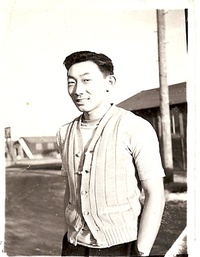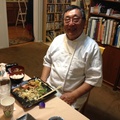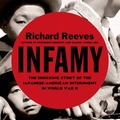January 10, 2012
The Honorable Barack Obama
President of the United States
The White House
1600 Pennsylvania Avenue NW
Washington, D.C. 20500
Dear President Obama,
Before I begin, I must say that I have the utmost respect for the Office of the President, and I want to thank you for the job you are doing under difficult circumstances and in an oftentimes hostile environment.
That being said, I must also express to you my deep disappointment and outrage at your “under the radar” New Year’s Eve signing into law of the National Defense Authorization Act.
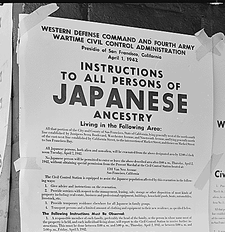
San Francisco, California. Exclusion Order posted at First and Front Streets directing removal of persons of Japanese ancestry from the first San Francisco section to be effected by the forced removal. (Source: Photo by Dorothea Lange. The U.S. National Archives and Records Administration) [210-G-A39]
I know you are aware that the law’s provision that gives the President authorization to order the U.S. Military to pick up and imprison without charge or trial, civilians, including American citizens, suspected of terrorism, anywhere in the world is a complete breach of our U.S. Constitution. You also know that the 5th Amendment provides in part that “no person shall be deprived of life, liberty or property, without due process of law.” This new law, according to writer Andrew Sullivan, “is a legal and indefinite abolition of habeas corpus.”
The words “authorization to order the U.S. Military to pick up and imprison without charge or trial, civilians, including American citizens” and “suspected” sends a chill down my spine. These words became a tragic reality for 120,000 Japanese Americans during WWII when President Roosevelt’s Executive Order 9066 authorized the U.S. military to forcibly remove American citizens, without cause or due process, and imprison them in ten desolate concentration camps located in the badlands of America—for over three years. It wasn’t until many years later that these “suspected” citizens were found to be innocent and this completely unnecessary—and unconstitutional—action against them has been proven to be a massive civil rights disaster unprecedented in American history.
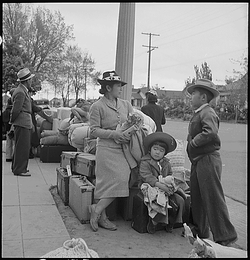
Hayward, California. Family of Japanese ancestry await forced removal (Source: Photo by Dorothea Lange. The U.S. National Archives and Records Administration [210-G-C173])
Having read your books, I know you are very aware about this dark chapter—and how our Constitution was trampled on in the name of “military necessity” (which was later proven to be false). I know you have voiced “serious reservations” about this bill when you signed it. And yet, instead of vetoing the bill, you signed it and with that signature you have opened the door for future presidents to do the exact same thing that was done to my family and the families of 120,000 other Japanese Americans.
I know you know that this was wrong, and yet you did it anyway. And I’m here to remind you that the consequences of those actions and the long-term damage done to Japanese Americans over 70 years ago are still being felt to this day. Allow me to share just a few of them with you.
My father, Nisei American Hiroshi Kashiwagi, was born in California and grew up as a loyal, patriotic American, just like the rest of those of his generation. He had never been to Japan, and had no loyalties to Japan. And yet, based on his Japanese race, he was branded a “non-alien,” forcibly removed from the only home that he knew and detained with the rest of his community at the concentration camp at Tule Lake, California. And because he refused to answer two deeply flawed, government-issued “loyalty” questions, he was branded a “disloyal,” a “trouble-maker” and one of the “bad Japanese Americans” for daring to defy the U.S. Government and protest his unjust incarceration. By refusing to answer, he says, “I was fighting for our civil rights.”
However, history has not been kind to those who protested against these infamous loyalty questions. The “disloyal” stigma of shame they have carried for all these years has been a heavy load to bear, and sadly, the wounds from this experience are still not completely healed, and probably never will be. Tragically, thousands who answered “No-No” to the loyalty questions have already gone to their graves with this heavy—and might I add unnecessary—burden still on their shoulders.
Along with my father and other protesters, there was another civil rights hero by the name of Gordon Hirabayashi, who recently passed away at the age of 93. Hirabayashi believed the Government’s actions were racially discriminatory. He refused to go to camp on Constitutional grounds, and went to prison because of it. His appeal against the U.S. Government went all the way to the Supreme Court.
“When my case was before the Supreme Court in 1943, I fully expected that as a citizen the Constitution would protect me,” he was quoted as saying. “Surprisingly, even though I lost, I did not abandon my belief and values. And I never look at my case as just my own, or just as a Japanese American. It is an American case with principles that affect the fundamental human rights of all Americans.”
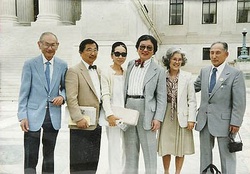
Photograph commemorating the efforts of the National Council for Japanese American Redress (NCJAR) to win redress through a class action suit against the government. 1987. Figures represented: Fred Korematsu, Gordon Hirabayashi, Michi Weglyn, William Hohri, Aiko Herzig and Harry Y. Ueno. (Gift of Hannah Tomiko Holmes, Japanese American National Museum [88.4.1b])
Over 40 years later, Hirabayashi’s conviction was overturned when it was proven to the courts that the incarceration was based on racism against Japanese Americans and not on military necessity.
Before he was exonerated, Hirabayashi said: “I want vindication not only for myself. I also want the cloud removed from over the heads of 120,000 others. My citizenship didn’t protect me one bit. Our Constitution was reduced to a scrap of paper.”
Our Government’s failure to defend our Constitution has had long-term negative consequences on a large group of innocent Americans. I have given you just a couple of examples, but the stories of suffering, hardship and loss are in the tens of thousands. I know you have said that you will not enforce parts of this law that encroach on the Constitutional rights of American citizens. However, Andrew Clark Arand, a professor of government at Georgetown University, said it best in a January 6, 2012 Reuters article: “Signing something and saying you are not going to follow portions of it is problematic,” he said. “I believe that the framers of the Constitution would have felt that’s exactly the kind of legislation you need to veto.”
I agree, and believe our Founding Fathers are turning over in their graves at the thought of this law. So is Gordon Hirabayashi. My mother, who was a nine-year-old girl when she was imprisoned at Tule Lake, wants you to know that she’s disappointed in you. My father, now 89, was outraged and wants to know, “What were you thinking?”
Last August, I was appointed as a Human Relations Commissioner for the City of Pasadena, California. At the swearing in ceremony before the Mayor and members of the City Council, I took a solemn oath to “preserve, protect and defend the Constitution of the United States against all enemies, foreign and domestic.” It is the same oath of office that you took. In the future, my hope is that you will continue to live up to this oath and steadfastly refuse to render our Constitution a worthless scrap of paper. My hope is that the mistake that is now signed into law will not come back to haunt our fellow Americans in the future. It has happened before, and for the sake of all the innocent Americans who suffered in America’s concentration camps, we must not let it happen ever again.
Thank you for your consideration.
Sincerely,
Soji Kashiwagi
© 2012 Soji Kashiwagi


